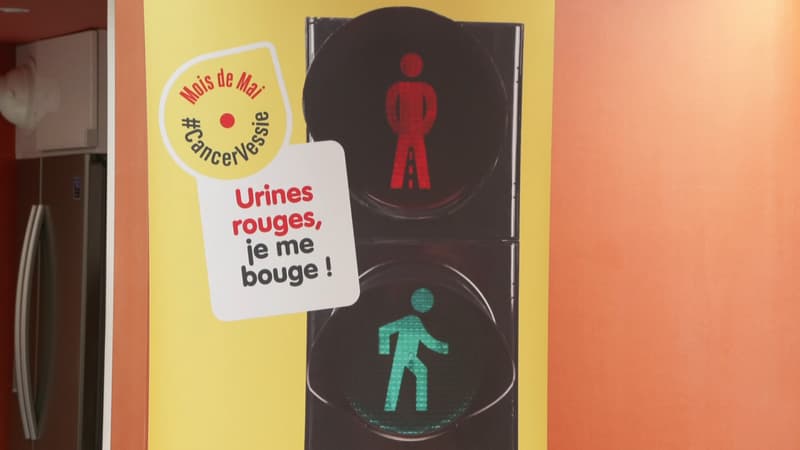“Red urine, I’m moving!” During the month of May, the French Association of Urology (AFU) launches an awareness campaign to fight against bladder cancer. Much less known than prostate cancer, bladder cancer affects between 13,000 and 20,000 new people each year and causes around 5,000 deaths.
If it is more about men over 60 years old and smokers, it does not exclude women. Around “a quarter of the patients are women” and their “proportion is increasing”, according to the president of the Cancer Vessie France patient association, Lori Cirefice.
“You have to dare, you have to go, you have to consult”
This is the case of Sarah, who was diagnosed with this 7 years ago. “I had blood in my urine and that alerted me, at first I thought maybe it was a problem with the (menstrual) cycle, I didn’t really ask myself the question, I left it hanging for a month or two.” I went to see my GP and he then referred me to a urologist,” she tells BFMTV.
After tests and an ultrasound, she learned that she had bladder cancer and had to undergo surgery. Now a member of the AFU, she wants to raise public awareness about the importance of early diagnosis.
“Unfortunately, it is a disease that is still very little known by the public, it is quite difficult to talk about these parts of the body because it is intimate, but you have to dare, you have to go there, you have to consult,” she encourages.
In the absence of a valid systematic detection method, warning signs are crucial. The presence of blood in the urine is the most common symptom. But it can also manifest as repeated cystitis, without infection being detected when looking for microbes in the urine, or problems urinating.
Bladder cancer “affects men more, but is usually more serious in women, because the symptoms can be misinterpreted and delay the diagnosis,” says Benjamin Pradère, member of the AFU oncology committee.
Consult “in case of doubt”
A scenario experienced by Catherine. “After a bypass (bariatric surgery, editor’s note), I often had blood in my urine. The treating doctor thought it was related to the operation. It did not go away. They sent me to see a gynecologist, who thought about micro periods, because I had an IUD,” he told AFP.
“It was prolonged, until the contractions and constant pressure on the bladder. Return to the gynecologist, ultrasound, always the hypothesis of micromenstruations or urinary infections. After a year, I could no longer restrain myself” from going to the bathroom. Finally a large mass appeared in the bladder,” recalls this 51-year-old Alsatian.
Then, everything happened: “8 hours of surgery” to remove “the mass”, announcement of an infiltrating cancer, removal of the bladder, uterus and lymph nodes, chemotherapy and immunotherapy. The former nanny, who does not know “when or where” she will be able to return to work “someday”, “she no longer lives the same life with a bag” (to replace the bladder) and “is not safe from escape” . “she carries spare and protective clothing.”
“Daily life is fine, but a little excessive physical effort causes stomach cramps,” adds Catherine, who advises, “especially women,” to consult “if there is the slightest doubt.”
A link between smoking and bladder cancer
Among the risk factors, tobacco occupies first place. The body expels through urine the toxins present in the blood, stored in the bladder before evacuation.
“This link between smoking and bladder cancer is poorly understood,” Lori Cirefice testified.
In Europe, the frequency of this cancer has increased in recent years “not only due to an increase in detections, but also to an increase in smokers”, according to Benjamin Pradère.
You also have to be careful with cannabis, warned Yann Neuzillet, surgeon and member of the AFU oncology committee: “young patients come to the clinic having been exposed to unlikely carcinogens through cannabis use (… ) combined with, sometimes, nothing, tires, cement…’.
Immunotherapy to strengthen the body’s defenses
More generalized, “certain exposures, especially professional ones, can cause bladder cancer: rubber, dyes, paints, cosmetics, certain hydrocarbons, pesticides in large agricultural regions”, Benjamin Pradère stressed if these carcinogens are less present than 20 or 30 years ago . In the world of work, previously exposed people remain at risk.
In the therapeutic arsenal, several innovations revolve around immunotherapy, which consists of strengthening the body’s defenses against diseases.
For patients in locally advanced stages or with metastasis, antibodies targeting certain molecules on cancer cells (“antibody-drug conjugates”, ADCs) also show promise, in combination with chemotherapy and immunotherapy, according to recent studies.
Source: BFM TV


